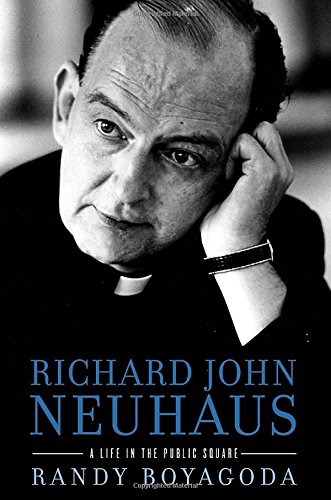Father Neuhaus’ Vocation
BOOK PICK: Richard John Neuhaus: A Life in the Public Square

RICHARD JOHN NEUHAUS
A Life in the Public Square
By Randy Boyagoda
Image Catholic Books, 2015
480 pages, $30 (hardcover)
To order:
It has been six years since Catholics mourned the death of Father Richard John Neuhaus, the Lutheran convert and founding editor of First Things magazine whose “caustic eloquence” as “a recurring actor-commentator … in his writing and in American public life” established him “as one of conservative Christianity’s foremost apologists, intellectual leaders, organizers and operators.” Those quotes come from Richard John Neuhaus: A Life in the Public Square, the new biography by a fellow Canadian, novelist Randy Boyagoda.
While the Lutheran pastor of an inner-city black church in Brooklyn, Neuhaus became “a leading clergyman of the American Left”; as late as the 1980s, Neuhaus still had enough influence to reach out to “the iconoclastic liberal writer Susan Sontag” on behalf of New York’s Cardinal John O’Connor.
But Neuhaus was essentially finished with the socially liberal ideology by the mid-1970s. While support for abortion was a factor, Neuhaus split with his old friends primarily over mainline Protestantism’s abandonment of Christian orthodoxy. In the mid-’80s, Neuhaus “increasingly aligned his life and work with the Catholic Church,” hosting Cardinal Joseph Ratzinger at a New York conference and becoming so well-known in Rome that Pope St. John Paul II was, according to an eyewitness, “delighted” when he learned in 1990 of Neuhaus’ becoming Catholic. One year later, the convert was ordained a priest.
Also in 1990, Father Neuhaus founded First Things, an ecumenical journal “unmatched by both conservative-intellectual and religiously focused publications for the range, vitality and firepower in evidence.” This was due in no small part to the 10,000-word monthly column he wrote until his death in 2009. By then, Father Neuhaus had an “unparalleled status as a Catholic intellectual leader among America’s social and cultural conservatives.”
Though admiring of Father Neuhaus’ career, Boyagoda is also at times critical of his prodigious output. Criticisms of Father Neuhaus during his life are also respectfully engaged.
As Boyagoda writes, “For all the many exploits he pursued, the source and summit of his life and work was his vocation as a pastor and, in time, a priest.”
I was a 23-year-old dissenter in 1993 when I subscribed to my first issue of First Things. Though I met him only a few times and corresponded with him only briefly, he played a pivotal role in the course of my adult life.
Father Neuhaus’ vision of the proper role of faith in American life — neither a medieval theocracy nor a “naked public square,” but, rather, a pluralism open to insights derived from the faith of most Americans — is needed more than ever. It falls to those who drank deeply at the well of his wisdom — the children of Neuhaus — to carry on his fight.
Peter Wolfgang is the executive director of the Family Institute of Connecticut.
- Keywords:
- April 19-May 2, 2015

















